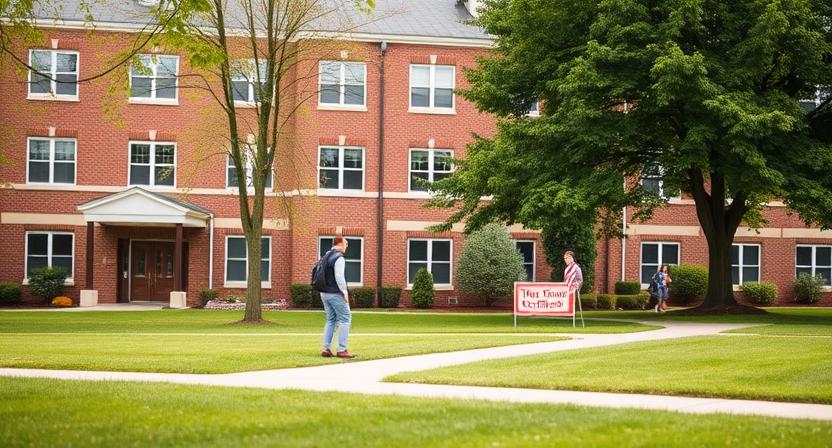The U.S. education system is facing a pivotal moment in 2025. With sweeping federal policy changes, staffing cuts, and mounting challenges around equity and access, schools and universities are adapting on the fly. From tightened immigration rules for foreign students to reforms in student aid and growing concerns about mental health in campuses, the landscape is evolving rapidly. This article digs into the freshest headlines shaping how Americans learn and teach today.
#1 The U.S. Department of Education has undergone major staff reductions, losing half its workforce since early 2025. This downsizing is causing delays in student financial aid processing, slower civil rights investigations, and increasing confusion around compliance for colleges nationwide.
The U.S. Department of Education has undergone major staff reductions, losing half its workforce since early 2025. This downsizing is causing delays in student financial aid processing, slower civil rights investigations, and increasing confusion around compliance for colleges nationwide.
The department also faces the daunting task of implementing the expansive “One Big Beautiful Bill,” which demands new data systems and accountability at a time when resources are scarce.
The effects are rippling through campuses, with many administrators warning of rising uncertainty and operational strain.
Federal Cuts Shake Education Foundations
 The U.S. Department of Education has undergone major staff reductions, losing half its workforce since early 2025. This downsizing is causing delays in student financial aid processing, slower civil rights investigations, and increasing confusion around compliance for colleges nationwide.
The U.S. Department of Education has undergone major staff reductions, losing half its workforce since early 2025. This downsizing is causing delays in student financial aid processing, slower civil rights investigations, and increasing confusion around compliance for colleges nationwide.The department also faces the daunting task of implementing the expansive “One Big Beautiful Bill,” which demands new data systems and accountability at a time when resources are scarce.
The effects are rippling through campuses, with many administrators warning of rising uncertainty and operational strain.
#2 In a move stirring debate, President Trump’s administration has cracked down on foreign students’ ability to study in the U.S., making visa approvals harder and restricting work options.
In a move stirring debate, President Trump’s administration has cracked down on foreign students’ ability to study in the U.S., making visa approvals harder and restricting work options.
Simultaneously, a new directive forces colleges to submit greater admissions data by race, increasing government oversight of enrollment decisions at elite schools.
These moves have sparked heated discussions about fairness, transparency, and the future of diversity in higher education.
New Rules Tighten College Admissions and Foreign Student Access
 In a move stirring debate, President Trump’s administration has cracked down on foreign students’ ability to study in the U.S., making visa approvals harder and restricting work options.
In a move stirring debate, President Trump’s administration has cracked down on foreign students’ ability to study in the U.S., making visa approvals harder and restricting work options. Simultaneously, a new directive forces colleges to submit greater admissions data by race, increasing government oversight of enrollment decisions at elite schools.
These moves have sparked heated discussions about fairness, transparency, and the future of diversity in higher education.
#3 Recent studies indicate that students from marginalized backgrounds receive less benefit from academic advising compared to their peers.
Recent studies indicate that students from marginalized backgrounds receive less benefit from academic advising compared to their peers.
This gap impacts their graduation timelines and GPA improvements, highlighting persistent inequities in support systems. Schools are being called to rethink advising practices to ensure all students have equal opportunities to succeed, as part of broader efforts to close achievement gaps across the country.
Rising Equity Concerns in Academic Advising
 Recent studies indicate that students from marginalized backgrounds receive less benefit from academic advising compared to their peers.
Recent studies indicate that students from marginalized backgrounds receive less benefit from academic advising compared to their peers. This gap impacts their graduation timelines and GPA improvements, highlighting persistent inequities in support systems. Schools are being called to rethink advising practices to ensure all students have equal opportunities to succeed, as part of broader efforts to close achievement gaps across the country.
#4 Mental health support remains a pressing issue on campuses, with anxiety and depression rates climbing, especially among underserved student groups. Universities face urgent pressure to expand counseling services and develop tailored interventions. Experts argue that addressing mental health holistically is essential for student success and retention as the academic year unfolds.
Mental health support remains a pressing issue on campuses, with anxiety and depression rates climbing, especially among underserved student groups. Universities face urgent pressure to expand counseling services and develop tailored interventions. Experts argue that addressing mental health holistically is essential for student success and retention as the academic year unfolds.
Mental Health Crisis in Higher Education
 Mental health support remains a pressing issue on campuses, with anxiety and depression rates climbing, especially among underserved student groups. Universities face urgent pressure to expand counseling services and develop tailored interventions. Experts argue that addressing mental health holistically is essential for student success and retention as the academic year unfolds.
Mental health support remains a pressing issue on campuses, with anxiety and depression rates climbing, especially among underserved student groups. Universities face urgent pressure to expand counseling services and develop tailored interventions. Experts argue that addressing mental health holistically is essential for student success and retention as the academic year unfolds.
#5
K-12 Schools Brace for Policy Shifts
On the K-12 front, districts are preparing for new education funding rules and accountability measures set to roll out this fall. School leaders are attending webinars and strategy sessions to navigate changes driven by the federal government, aiming to optimize resources amidst uncertainty. The focus remains on maintaining educational quality while adapting to evolving regulatory demands.
#6
Stricter visa and admissions data rules are shaping college demographics.
Marginalized student groups face uneven advising benefits, highlighting equity issues
Mental health support is a growing priority in higher education.
K-12 schools are preparing for policy shifts impacting funding and accountability.
Key takeaways
- Department of Education staff cuts are causing nationwide processing delays and oversight challenges.Stricter visa and admissions data rules are shaping college demographics.
Marginalized student groups face uneven advising benefits, highlighting equity issues
Mental health support is a growing priority in higher education.
K-12 schools are preparing for policy shifts impacting funding and accountability.
#7
Disclaimer
The information provided is NOT financial advice. I am not a financial adviser, or a news reporter/journalist, accountant or the like. This information is purely from my own due diligence and an expression of my thoughts, my opinions based on my personal experiences and the help from technology information gathering tools which describe the movement of the market, news, headlines, coin or any relevant information which is human changed and reedited.Reactions
0
0
0
0
0
1
Already reacted for this post.
Reactions
1
YOU MAY ALSO LIKE

0
95
0
October 8, 2025

0
114
0
October 6, 2025




